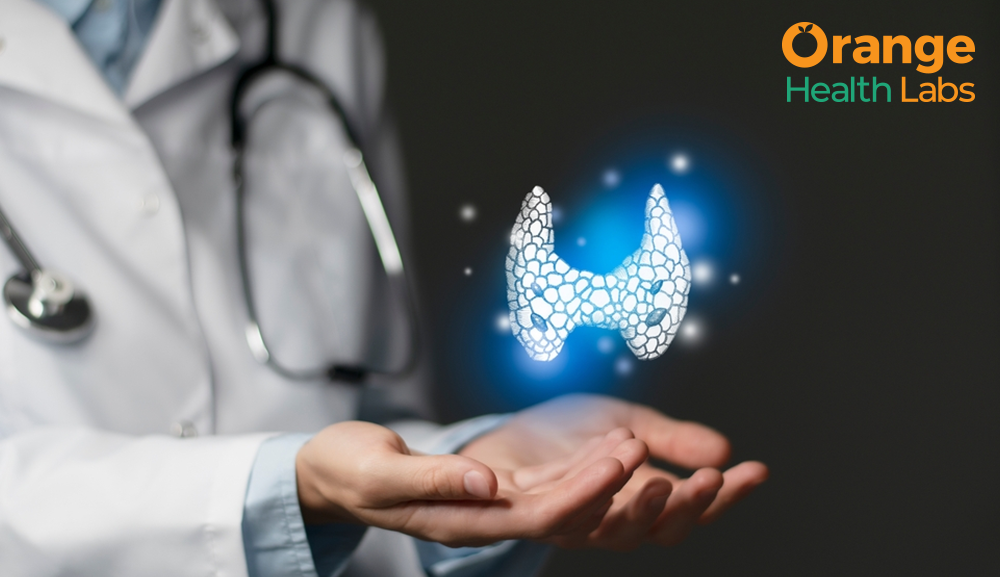Search for tests or checkups
SupportWhy Thyroxine Matters: Exploring its Essential Functions in the Body

The thyroid is a gland in the neck region with a butterfly shape that produces hormones essential for the body’s functioning. The major hormone released by the thyroid gland into the bloodstream is thyroxine. Its primary role is to impact metabolic processes, supporting heart and muscle health, brain development, and bone maintenance. Thyroxine (T4) is the less active form, which the body converts into its more active form, triiodothyronine (T3). Monitoring these hormones is important, and a thyroid function test can provide valuable insights into your thyroid health.
Test for Thyroid Hormones in Your City: Thyroid Profile Test in Mumbai | Thyroid Profile Test in Delhi | Thyroid Profile Test in Hyderabad | Thyroid Profile Test in Noida | Thyroid Profile Test in Gurgaon | Thyroid Profile Test in Bangalore
Now, let’s discuss the importance of T4 and its functions.
Thyroxine Hormone Function: An Overview
T4 affects the functioning of almost every part of the body; therefore, is considered the key thyroid hormone. The role of thyroxine is to facilitate the following tasks in your body:
- Controlling your calorie (or energy) expenditure, known as the metabolic rate
- Maintaining your heart function
- Promoting bone development in children
- Affecting the growth of the brain
- Impacting menstruation, ovulation, and fertility
- Regulating body temperature
- Modulating the function of your digestive system
- Controlling the contraction of your muscles
- Regulating the rate at which your body replaces dying cells (a natural process)
Since every organ is affected by thyroxine hormone function, maintaining healthy levels of this hormone is essential.
Role of Thyroxine in Metabolism
- The thyroid hormones (TH), T3, and T4, collectively control the body’s metabolic processes by balancing energy storage and expenditure, which is necessary for healthy growth and development of the body.
- The essential function of thyroxine is to establish the basal metabolic rate (BMR) of the body, thus effectively controlling how many calories are burned by the body at rest. BMR describes the spending of energy by the body, which is significantly regulated by T4. A low BMR can lead to obesity and weight increase and vice-versa.
- T4 affects how the carbohydrates in food are metabolised (used up), particularly through influencing the liver's sensitivity to insulin and the inhibition of glucose production. Fat metabolism (both lipolysis and lipogenesis) is also stimulated by T4, and the net effect of increased T4 is fat loss.
- T4 regulates body temperature owing to its effect on metabolism. Individuals who have hypothyroidism (less TH levels) or hyperthyroidism (high TH levels) exhibit cold or heat intolerance, respectively.
What Is the Function of Thyroxine in the Body
Almost all organ systems in the body are impacted by the T4 hormone, including the heart, central nervous system (CNS), autonomic nervous system, bone, digestive system, and metabolism.
- Brain and CNS
T4's effect on the CNS is crucial. It is essential for the brain development of children throughout the early stages of pregnancy. Thyroid hormone also aids in the maturation of the brain and cognitive function.
- Heart
T4 causes catecholamines (the hormones responsible for the fight or flight response)6 to be more permissive. It helps in regulating the heart rate and blood pressure.
- Digestive System
Another role of thyroxine is to manage how quickly food passes through your digestive system. Constipation and anorexia (eating disorders) are the most typical symptoms of hypothyroidism. Meanwhile, hyperthyroidism frequently results in diarrhoea and an increase in appetite.
- Muscles and Bones
The T4 hormone produces an increase in muscle strength by increasing the production of type 2 muscle fibres that can contract quickly and forcefully. Thyroid hormones and growth hormones work together to promote bone growth in children.
What Happens if Thyroxine Is Low (Hypothyroidism)
In hypothyroidism, the thyroid gland produces too little thyroxine. It could be brought on by autoimmune disorders, inadequate iodine consumption, pollutants (sometimes referred to as endocrine disruptors), or even by taking specific drugs.
Untreated hypothyroidism may result in:
- Slower Metabolism
This leads to a decrease in BMR, resulting in weight gain, decreased appetite and fatigue.1
- Cognitive Impairment
Mental disability and stunted growth in children (if deficiency is present before birth or during infancy) can be observed since thyroid hormones are crucial for both the physical and mental development of the foetus. Impaired memory and mood alterations can occur in adults 1, 4
- Cold Intolerance
Due to a lower metabolic rate, there is less heat production by the body, which leads to an inability to tolerate cold.
Other symptoms include:
- Low heart rate
- Tiredness and fatigue
- Muscular stiffness
- Decreased fertility
What if Thyroxine (T4) Is High (Hyperthyroidism)
Thyrotoxicosis occurs when there is an excessive amount of thyroxine in the blood. This may be brought on by hyperthyroidism (excess thyroid hormone production), thyroid gland inflammation that releases too many hormones into the bloodstream, Graves’ disease (an autoimmune disease), or a tumour of the thyroid gland (Plummer's adenoma or toxic nodular goitre).
Hyperthyroidism causes:
- Increased Metabolism
The increase in BMR results in weight loss, tiredness, fatigue, excessive sweating and increased hunger.
- Increased Heart Rate
Due to increased contraction of the heart, fast or irregular heartbeats, palpitations, hypertension, arrhythmia or heart failure can occur.
- Neuropsychiatric Symptoms
High thyroxine levels can lead to restlessness, anxiety and depression, unstable emotional state, insomnia, tremors and hyperactive reflexes.
Other symptoms include:
- Abnormal menstrual cycle
- Increased bowel movements
- Nail detachment from the nail bed (known as onycholysis)
- Fractures observed in elderly persons
- Heat intolerance
- Hair thinning/loss
Role of Thyroxine in Growth and Development
Thyroxine regulates multiple processes in the body and is responsible for maintaining overall health in children as well as adults.
- Thyroxine hormone function impacts brain function throughout life and is vital for brain development even before birth. Thyroid hormone aids in the maturation of the brain in children in the womb by promoting the synthesis of nerve fibres. Lack of T4 hormone during pregnancy and after birth may have a serious impact on the brain, resulting in intellectual deficiencies, delayed maturation, and neurological damage.
- In children as well as young individuals, thyroid hormones work together with growth hormones to collaboratively promote bone development. They trigger the activation of bone cells, like chondrocytes, osteoblasts, and osteoclasts.
Thyroxine is an important hormone that has an impact on many areas of your body. You may occasionally have too little or too much thyroid hormone. To find out if your thyroid hormone levels are normal, a few blood tests (thyroid function tests), which includes the T4 test, will be required by your healthcare provider. For quick and accurate results, book your tests at Orange Health Labs and get them done at your doorstep.

Managing Fasting Blood Sugar Levels: Highs, Lows, and Healthy Range

Full Body Checkup and Women’s Health: Special Considerations
